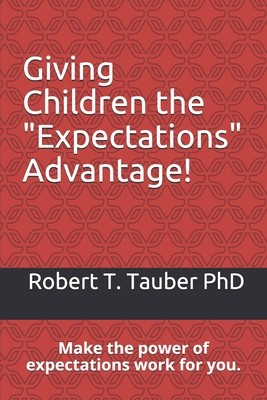| Giving Children the "Expectations" Advantage!: Make the power of expectations work for you. Contributor(s): , Robert T. Tauber (Author) |
|
 |
ISBN: 1095463977 ISBN-13: 9781095463970 Publisher: Independently Published OUR PRICE: $7.12 Product Type: Paperback Published: April 2019 |
| Additional Information |
| BISAC Categories: - Psychology | Education & Training |
| Physical Information: 0.4" H x 5.98" W x 9.02" (0.58 lbs) 174 pages |
| Descriptions, Reviews, Etc. |
| Publisher Description: Two Expectations Truisms. First impressions are lasting impressions, and you never get a second chance to form a first impression. The power of expectations, better known as the Self-Fulfilling Prophecy (SFP), operates everywhere - at home, school and work. There is no way to stop the power of expectations, it either benefits you or your children OR it works against you or your children. It is one way or the other. Reading this book can help you help teachers to form more positive expectations of your child.Teachers believe that they are good judges of character. They believe that can tell, at just a glance, which children are likely to achieve, and which will not - which children are likely to be a joy to have in class and which children likely will be a problem. Once teachers have "pegged" a child one way or the other, they will look for evidence to back up their initial expectations. And, I guarantee they will find it The eye sees what it wants to see Teachers have a stake in the expectations they form of children being realized, because if the child turns out differently than the teachers expected then the teachers would have to admit that they are not very good judges of character.The word "expectations" sounds a bit harmless, but when abused, accidently or on purpose, the outcomes for children can be devastating. Just imagine an environment (i.e., school) where your child is bombarded day after day, and year after year, with negative expectations, bias, or prejudice. Your child's chances of succeeding would be severely diminished. On the other hand, imagine an environment where your child is bombarded by positive expectations. Success is almost guaranteed.This book explains how the Self-Fulfilling Prophecy (SFP) works and what you can do at home and at school to positively intervene on your child's behalf. The bulk of the book, then, identifies and explains the various human characteristics that teachers (and others) use to "peg" your child one way or the other. Among the major expectations generating characteristics are "Given Name," "Dialect," "Vocabulary," "Gender," "Body Build," "Attractiveness," "Race," 'Ethnicity," and "Socio-Economic Status." Many less major human characteristics that trigger expectations also are addressed - some, such as whether your child attends an a.m. or p.m. kindergarten, or how manly his handshake is, almost seem ludicrous. But, they can trigger unwanted negative teacher expectations.The expectations that teachers form of you child, positive or negative, influence how they will interact with your child. High-expectations students are seated closer to the teacher, academically challenged more, given more time to deliver what the teacher expects to be a high quality response, often given "clues" to help them answer, grouped together for mutual stimulation, receive more teacher smiles, and are assigned more tasks designed to help develop their leadership experiences. Low-expectations students do not fare so well. Teachers' actions towards them often conveys for all in the room to notice that they are less capable, less responsible, unlikely to advance beyond their assigned low group and given less time to answer even the simplest of questions sent their way. |